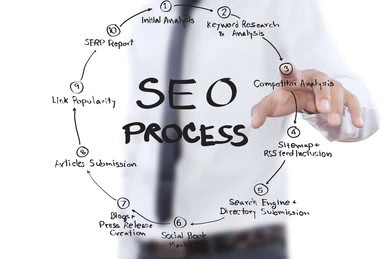Achieving a top SEO ranking is no longer just for professionals. With a bit of patience, determination, and the right techniques, you can implement a successful SEO strategy without a degree or formal experience.
Here’s how you can self learn SEO and become a self taught SEO specialist.

Understanding the Basics of SEO Ranking
The concept of Search Engine Optimization, commonly referred to as SEO, involves a variety of strategies and methods used by website owners to boost their site’s visibility and standing on search engine results. The ultimate aim of SEO Ranking is to pull in organic, non-paid traffic to your website. It’s important to note that SEO isn’t solely about search engines, but also about good SEO practices that improve the user experience and usability of a website.
Essentially, SEO is a mixture of both technical and creative components that not only boost your site’s ranking but also enhance the user experience. The key elements of SEO include the use of relevant keywords, production of quality content, and acquisition of backlinks.
Keywords play a significant role in SEO Ranking as they are the terms that users enter into search engines when looking for information. Having the right keywords can increase the chances of your website appearing in search results. Content is another crucial element. By creating valuable, engaging content, you can keep visitors on your site longer and encourage them to return.
Backlinks, which are links from other websites to your site, are also a vital component of SEO. These serve as a signal to search engines that your content is valuable and trustworthy.
To sum up, understanding the basics of SEO involves familiarizing yourself with the fundamental elements—keywords, content, and backlinks—and how they work together to improve your website’s visibility and user experience. In the following sections, we will delve deeper into these elements and how you can effectively use them in your SEO strategy.
Identifying and Implementing Target Keywords
The foundation of any effective SEO strategy lies in the use of the right keywords. These are the terms and phrases that users input into search engines when conducting an online search. The first step in your SEO journey should involve identifying these key terms that relate to your site. To do this effectively, you need to think from the perspective of your target audience. What would they type into the search engine when searching for the services or information your website offers? Several online tools, such as Google’s Keyword Planner or SE Ranking, can assist you in discovering high-traffic keywords that are relevant to your niche.
Once you have established a list of target keywords, the next step is to integrate them into your website content. This doesn’t mean stuffing your content with keywords, but rather naturally incorporating them in a way that does not compromise the readability or quality of your content. This could be within the main body of your text, the meta descriptions, the URLs of your web pages, or even within the alternative text descriptions of your site’s images.
Remember, while including keywords is vital for SEO, it’s crucial that they flow organically within your content and are relevant to what your website offers. Overuse of keywords, also known as “keyword stuffing,” can lead to penalties from search engines. Instead, strive for a balance between using your target keywords and maintaining high-quality, reader-friendly content. This approach will benefit both your site’s SEO and the user experience for your visitors.
Your focus should be on optimizing your content with keywords that not only drive traffic but also meet the needs of your users, as this combination is the key to improving your SEO ranking. Each keyword you choose should be carefully researched and selected for its potential to attract qualified traffic to your site.
In essence, the identification and implementation of target keywords is a crucial skill in SEO, requiring a blend of strategic thinking, research, and content optimization. By mastering this aspect of SEO, you’re setting your website up for improved visibility and ranking success.
Creating Informative and Engaging Content
To climb up the ranks of search engine results, your website needs to offer content that provides significant value to its audience. This implies the development of material that is not only captivating and unique but also thoroughly answers your users’ queries and motivates them to stay and delve deeper into what your website has to offer.
The essence of exceptional content lies in its ability to resonate with its readers, solve their problems, or provide them with the information they’re searching for. Hence, the focus should be on understanding your target audience’s needs and crafting your content to meet these needs effectively. You can employ different types of content such as blog posts, infographics, videos, podcasts, or e-books to keep your audience engaged and cater to their different content consumption preferences.
While generating this valuable content, make sure it’s structured well for easy readability. Break up your text into manageable chunks using headers, subheaders, bullet points, or lists. Including relevant images or graphics can also help to explain complex information or break up large sections of text.
Moreover, regular updates to your content are essential as this keeps your website fresh and relevant. Content that is outdated or no longer accurate can make your website lose credibility, which can negatively affect your SEO ranking. Updating your content with the most recent information signals to search engines that your website is a reliable and current source of information.
Importantly, high-quality content is more likely to attract backlinks, which significantly boosts your SEO ranking. When other websites link to your valuable content, it demonstrates to search engines that your website is a credible source of information. These backlinks can significantly improve your website’s visibility and ranking.
Understanding and Utilizing On-Page SEO
On-Page SEO is a crucial factor in optimizing your website for higher search engine rankings. It pertains to all the measures that can be applied directly within your website to enhance its position in the search rankings. Key elements of On-Page SEO include title tags, meta descriptions, and image alt text.
Title tags are essentially the name of your web page. They are crucial as they let search engines understand what your page is about. An optimized title tag should include your target keyword, be compelling enough to entice users to click, and be no longer than 60 characters to ensure it displays fully on search engines.
Meta descriptions provide a summary of your page content. While not a direct ranking factor, they play an indirect role by affecting your click-through rate. An enticing meta description that includes your target keyword can increase the chances of users clicking on your site in search engine results.
Alt text is a description that you can add to the images on your site. It helps search engines understand the content of your images. Including your target keywords in the alt text can contribute to your overall keyword strategy, but be careful not to overdo it.
In addition, the structure of your URL can also impact your On-Page SEO. A clean URL that includes your keyword can help both search engines and users understand what your page is about. For example, a URL like “www.yourwebsite.com/seo-tips” is preferable over something like “www.yourwebsite.com/page123”.
Last but not least, the mobile-friendliness of your site is a critical aspect of On-Page SEO. With an increasing number of users browsing the web on mobile devices, search engines like Google reward sites that perform well on all devices, not just desktops.
From crafting compelling title tags and meta descriptions to optimizing images with alt text and ensuring mobile-friendliness, On-Page SEO is a multifaceted discipline that requires careful attention to detail. By understanding and effectively utilizing these strategies, you can significantly enhance your site’s visibility in search engine results.
Mastering Off-Page SEO Techniques
Off-Page SEO encompasses the steps taken outside of your actual website to impact your rankings within search engine results pages. The fundamental focus of Off-Page SEO is link building, which is the process of acquiring backlinks, or links from other sites directed towards your own. These backlinks are perceived as votes of confidence by search engines, signifying that your site offers worthwhile content.
The quality of your backlinks is just as, if not more, important than the quantity. Backlinks from high-authority, credible sites carry more weight than those from lesser-known, less trustworthy sites. It’s therefore advantageous to aim for backlinks from well-regarded websites within your industry or niche.
There are various strategies you can use to secure high-quality backlinks. One of these is guest blogging, where you write articles for other websites or blogs in your industry. These articles usually include a link back to your site, thereby providing a reputable backlink. This approach not only aids in building backlinks but also establishes you as an authority in your field and can lead to increased traffic to your site.
Social media marketing is another useful Off-Page SEO technique. By creating engaging content and sharing it on social media, you can encourage others to share your content and link back to it on their own sites or social media profiles. Although social media links are typically ‘no-follow’ and do not directly impact your SEO, the increased visibility and traffic they bring can indirectly benefit your ranking.
Participating in online discussions related to your industry, such as on forums or in comment sections, can also be an effective way to build backlinks. By adding value to the conversation and including a link back to your website where relevant, you can enhance your site’s visibility and credibility.
Remember, Off-Page SEO techniques should be carried out ethically and in compliance with search engine guidelines. Engaging in practices such as buying backlinks or spamming can result in penalties that can severely harm your SEO Ranking.
In essence, mastering Off-Page SEO involves honing your ability to create valuable content that others want to share, and actively pursuing opportunities to establish your website as a trusted resource. This not only aids in improving your SEO ranking but also positions you as a leader in your field.
Regularly Monitoring and Adjusting Your SEO Strategy
Effective SEO is not a one-and-done deal but an ongoing process that involves regular tracking and fine-tuning. Utilizing tools like Google Analytics or SE Ranking, it’s crucial to continuously assess your website’s performance. Key metrics to track include site traffic, bounce rate, and conversion rate. These insights can give you a clear understanding of what’s working and what areas need improvement.
Also, keeping a close watch on any shifts in your SEO ranking is essential. Don’t hesitate to modify your tactics if you notice a drop in rankings or if certain strategies aren’t yielding the desired results. SEO is a dynamic field, and what worked yesterday might not work today. Therefore, being flexible and adaptable is key to maintaining and improving your website’s visibility.
Additionally, make it a point to stay informed about the latest SEO trends and updates to Google’s algorithm. The search engine giant frequently rolls out updates that can dramatically impact your website’s ranking. By keeping yourself informed about these changes, you can adjust your SEO Ranking strategy accordingly and stay ahead of the competition.
Furthermore, analyze the performance of your target keywords. Keep track of which ones are driving the most traffic to your site and contributing to conversions. If some keywords are underperforming, consider revising them or focusing on others that might be more effective.
Remember, SEO is an iterative process. Your initial strategy will likely need adjustments over time. The key is to keep testing, measuring, learning, and refining your approach based on the data. By consistently monitoring and adapting your SEO strategy, you can ensure that your website continues to attract, engage, and convert your target audience, leading to sustained growth and success.
Conclusion
Mastering SEO on your own is achievable and rewarding. Understanding SEO basics like keywords, content quality, on-page and off-page optimization, and monitoring your strategy is crucial.
With dedication and learning, anyone can improve their website’s visibility and ranking. Embrace SEO’s iterative nature, stay updated on trends, and adapt your approach for long-term success in driving organic traffic and meeting online goals.






